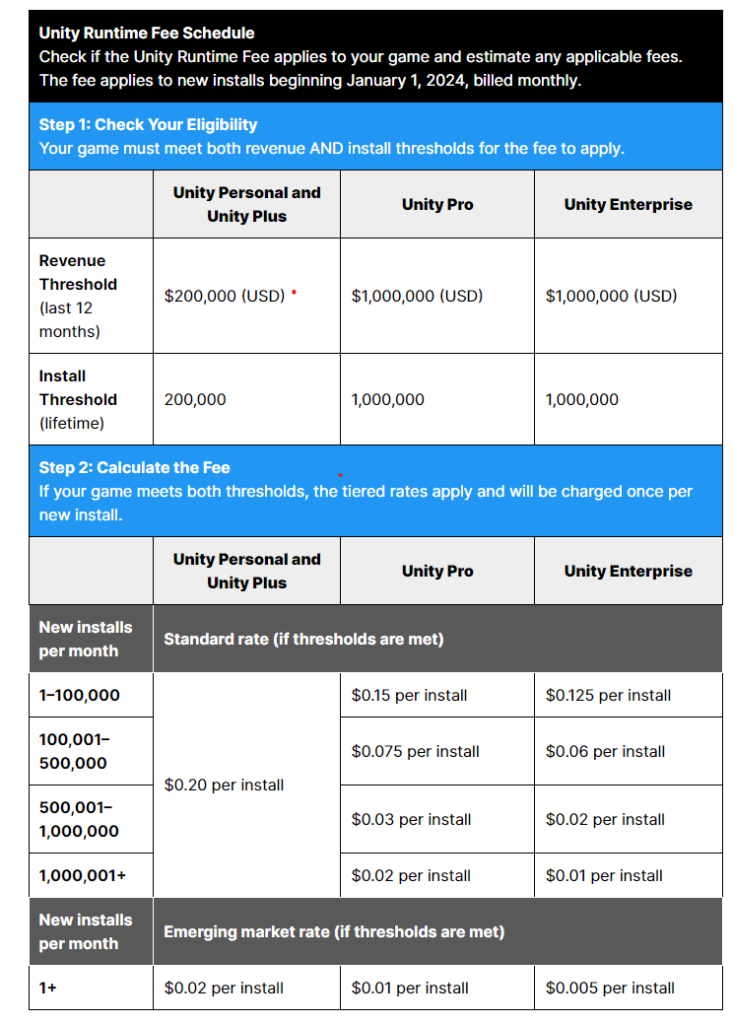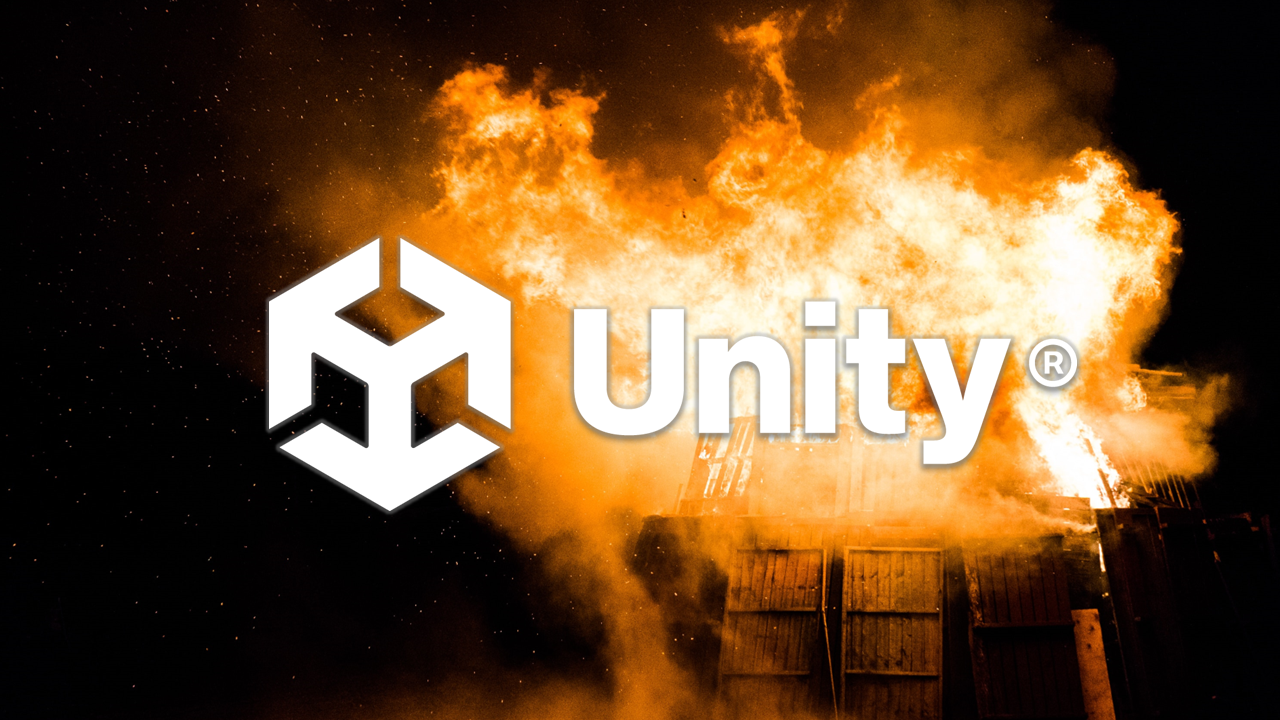Unity has been at the receiving end of ire from the Game development community and here’s what’s happening.
In a startling move that has left the game development community reeling, Unity, the company behind one of the most prolific game engines, has announced a new pricing model set to go live on January 1, 2024. Unlike Unity’s traditional royalty-free licensing structure, this change introduces a “per-install” fee, triggering outrage and concern among developers.
Breaking Down the New Pricing Structure
Unity’s “Runtime Fee” is poised to impact developers based on the number of game installations. The fee structure varies depending on the subscription tier:
- Unity Personal: Developers under this tier will incur a $0.20 per-install fee after their game achieves $200,000 in annual revenue and 200,000 lifetime installs.
- Unity Pro and Enterprise: These tiers will experience slightly lower per-install fees starting at $0.125 to $0.15 after a game reaches $1 million in annual revenue and 1 million total installs. Volume discounts will apply for heavily installed games, potentially going as low as $0.01 per install for games with 1 million monthly installations.
The new pricing model will affect certain countries, including the United States, Australia, Austria, Belgium, Canada, Denmark, Finland, France, Germany, Ireland, Japan, Netherlands, New Zealand, Norway, Sweden, Switzerland, South Korea, and the United Kingdom. In other countries, an “emerging markets rate” ranging from $0.005 to $0.02 will apply after meeting the minimum thresholds.

Developer Shock, Outrage & Concerns
Unity’s decision to switch to a per-install fee structure has sparked widespread anger within the game development community. This change fundamentally contradicts Unity’s previous approach, which allowed developers making under $100,000 per month to enjoy fee-free usage of the Unity engine. Larger developers, earning $200,000 or more monthly, paid only per-seat subscription fees for access to Unity’s full-featured Editor.
This shift has not only infuriated developers but has also cast a shadow on trust in Unity. Many developers are concerned about retroactive changes, as the new fee structure will apply to previously existing Unity games. Developers who invested significant time and resources into Unity based on its royalty-free structure now feel betrayed.
The outcry was loudest on X, formerly Twitter. Developers were up in arms as the changes in the pricing structure for Unity’s game engine could result in Unity charging more than the developer will ever make. This would create a very unsustainable development cycle for games. In a post on X, Gary Newman, founder of Facepunch – the company behind the hit game Rust, outlined that the new pricing policy not only increases the price of maintaining and developing games, it does so exponentially. In his post, he outlines what would have cost his company USD$410,000 over the lifetime of the game, it would cost the company USD$2,517 a month barring increases to the install base of Rust. In an interview with IGN, Newman has come out saying that Rust 2 would not be a Unity based game due to the changes.
Developer Aggro Crab also highlights that games on services like Xbox Game Pass and PlayStation Plus would incur costs simply for access to the user base when they agree to list on these services. Let’s not forget massive games like Honkai Star Rail and Genshin Impact that use Unity’s development engine and are free to play would incur massive fees which could put companies like Hoyoverse and Aggro Crab out of business. Let’s not forget games like PokémonGO.
Possible Misuse and Privacy Concerns
Developers fear the potential for abuse in a per-install fee model. Groups of gamers with a history of “review bombing” could theoretically engage in “install bombing” by repeatedly installing and deleting a game, incurring costs for the developer with each new installation. Pirated copies of games could also be factored into the fee calculations, adding costs for illicit downloads.
Initially, Unity stated that the per-install fee would apply even if a user deleted and re-installed a game. However, they later adjusted this stance to charge only for the initial installation on a single device with exceptions for secondary devices like the Steam Deck. In addition, the wording of the announcement and its terms and conditions indicate that fees would be incurred by the distributing entity. This would mean that platforms like Steam, Epic Game Store and App Store would be the ones who would incur the charge and not developers.
Developers also question Unity’s ability to accurately track installations, raising concerns about privacy and the accuracy of Unity’s counting methods. These concerns and the uproar at the change in pricing have resulted in a massive dip in Unity’s shares with the trend continuing today after some reprieve. What’s even more intriguing is the fact that the top brass in Unity divested a portion of their shares days before the announcement. CEO Jon Riccitiello alone sold 2,000 shares the week before the announcement according to Kotaku.
Impact on Game Business Models
Unity’s new fee structure could significantly impact the feasibility of various game business models. It may discourage developers from offering low-cost games due to the additional fee burden. Additionally, games distributed through subscription services like Microsoft’s Game Pass may face financial challenges due to per-install fees.
Some developers are urging players not to install their games in protest of the new fee. The overall sentiment among developers is one of frustration and distrust, with many questioning Unity’s commitment to its user base. Some developers are looking into delaying upcoming games to jump to another engine like Valve’s Unreal Engine. It’s worth noting that Unity was launched to “democratize game development” and now, it seems like the company wants to cash in in the most douchy way possible. Having only just gained prominence in recent years, the company is looking at a possible mass exodus of developers from its platform due to the pricing change that is due to come into effect in 2024.
Unity’s announcement has set off a firestorm of controversy, with developers clamouring for changes to restore trust and transparency in their relationship with the platform provider.






